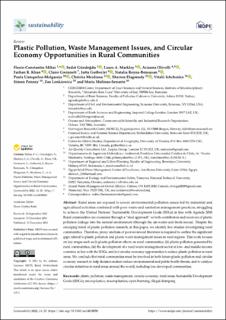| dc.contributor.author | Mihai, Florin-Constatin | |
| dc.contributor.author | Gündoğdu, Sedat | |
| dc.contributor.author | Markley, Laura A. | |
| dc.contributor.author | Olivelli, Arianna | |
| dc.contributor.author | Khan, Farhan | |
| dc.contributor.author | Gwinnett, Claire | |
| dc.contributor.author | Gutberlet, Jutta | |
| dc.contributor.author | Reyna-Bensusan, Natalia | |
| dc.contributor.author | Llanquileo-Melgarejo, Paula | |
| dc.contributor.author | Meidiana, Christa | |
| dc.contributor.author | Elagroudy, Sherien | |
| dc.contributor.author | Ishchenko, Vitalii | |
| dc.contributor.author | Penney, Simon | |
| dc.contributor.author | Lenkiewicz, Zoe | |
| dc.contributor.author | Molinos-Senante, María | |
| dc.date.accessioned | 2022-06-13T12:23:06Z | |
| dc.date.available | 2022-06-13T12:23:06Z | |
| dc.date.created | 2022-03-31T11:20:34Z | |
| dc.date.issued | 2022 | |
| dc.identifier.citation | Sustainability. 2022, 14 (1), . | en_US |
| dc.identifier.issn | 2071-1050 | |
| dc.identifier.uri | https://hdl.handle.net/11250/2998537 | |
| dc.description.abstract | Rural areas are exposed to severe environmental pollution issues fed by industrial and agricultural activities combined with poor waste and sanitation management practices, struggling to achieve the United Nations’ Sustainable Development Goals (SDGs) in line with Agenda 2030. Rural communities are examined through a “dual approach” as both contributors and receivers of plastic pollution leakage into the natural environment (through the air–water–soil–biota nexus). Despite the emerging trend of plastic pollution research, in this paper, we identify few studies investigating rural communities. Therefore, proxy analysis of peer-reviewed literature is required to outline the significant gaps related to plastic pollution and plastic waste management issues in rural regions. This work focuses on key stages such as (i) plastic pollution effects on rural communities, (ii) plastic pollution generated by rural communities, (iii) the development of a rural waste management sector in low- and middle-income countries in line with the SDGs, and (iv) circular economy opportunities to reduce plastic pollution in rural areas. We conclude that rural communities must be involved in both future plastic pollution and circular economy research to help decision makers reduce environmental and public health threats, and to catalyze circular initiatives in rural areas around the world, including less developed communities. | en_US |
| dc.language.iso | eng | en_US |
| dc.rights | Navngivelse 4.0 Internasjonal | * |
| dc.rights.uri | http://creativecommons.org/licenses/by/4.0/deed.no | * |
| dc.title | Plastic Pollution, Waste Management Issues, and Circular Economy Opportunities in Rural Communities | en_US |
| dc.title.alternative | Plastic Pollution, Waste Management Issues, and Circular Economy Opportunities in Rural Communities | en_US |
| dc.type | Peer reviewed | en_US |
| dc.type | Journal article | en_US |
| dc.rights.holder | © 2021 by the authors | en_US |
| dc.description.version | publishedVersion | en_US |
| cristin.ispublished | true | |
| cristin.fulltext | original | |
| cristin.qualitycode | 1 | |
| dc.identifier.doi | 10.3390/su14010020 | |
| dc.identifier.cristin | 2014102 | |
| dc.source.journal | Sustainability | en_US |
| dc.source.volume | 14 | en_US |
| dc.source.issue | 1 | en_US |
| dc.source.pagenumber | 48 | en_US |

